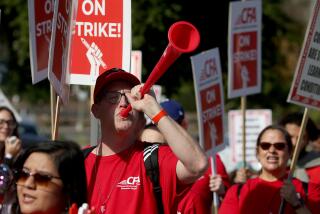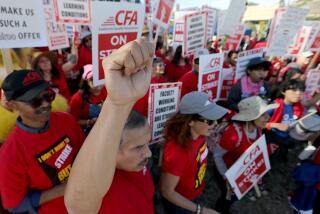West Virginia teachers win 5% pay raise as massive strike comes to an end
Two months ago, West Virginia state Sen. Richard Ojeda warned his fellow lawmakers of the danger of denying pleas from teachers for a pay raise.
“We’re not listening to our teachers,” Ojeda, a Democrat, said during a Senate session on Jan. 17. “You’re sitting on a powder keg.”
He was right. A strike by teachers gripped every school district in the state for nine days — until the Legislature passed a 5% raise Tuesday and Republican Gov. Jim Justice signed it into law. The raise will apply to all state public employees.
The drama in West Virginia has emboldened teachers and public-employee unions across the U.S.
In Oklahoma, teachers and school districts inspired by the strike continued to take steps to prepare for a possible statewide walkout of their own. Administrators at two of the state’s largest school districts, in Tulsa and Oklahoma City, have signaled their readiness to shut down schools to push the Legislature for more funding for teacher pay.
“The Oklahoma City Public Schools Board of Education is in full support of our teachers and stands ready to take any steps necessary to improve conditions for our teachers — including a districtwide suspension of classes,” the district said in a resolution approved Monday.
The bug may have also spread to Arizona — a state that, like Oklahoma and West Virginia, is near the bottom of the nation’s ranks for teacher pay by some measures. On Wednesday, Arizona teachers plan to wear red as a visual demonstration in support of higher funding from state lawmakers.
In West Virginia, rank-and-file union members rejected a deal their own union leaders had made with legislators and refused to back down until a raise had been signed into law. It was the first teachers’ strike in the state since 1990.
Chants of “Back to school!” broke out in the halls of the Capitol after lawmakers approved the pay increase. Teachers also sang West Virginia folk anthem “Take Me Home, Country Roads,” by John Denver: “Country roads, take me home, to the place where I belong: West Virginia.”
“What a good day,” the governor said at a news conference, expressing eagerness to get students back to school as teachers cheered. “Our children have suffered enough.”
“Yes, they have,” a woman called out from the crowd.
Christine Campbell, president of the American Federation of Teachers’ West Virginia branch, said in a statement: “This is a huge victory and symbol of respect for every teacher and school support staff member in the state of West Virginia.”
“The strike and its strong outcome should be seen as a shot across the bow to every lawmaker who may underestimate the support teachers have, the hard job they do and their willingness to stand up for what they deserve as they educate the next generation,” she said.
But the victory only concludes what is likely to be the first round in a larger war.
The state still awaits an uneasy discussion over how to control soaring healthcare costs that were at the core of many teachers’ decisions to go on strike in the first place.
As healthcare costs have continued to rise, employees had been asked to pay higher premiums, which teachers said would effectively cut their pay each year. The premiums cover 20% of the cost of insurance provided to state employees by the Public Employees Insurance Agency.
After teachers started their strike, the governor said the state would freeze premiums while a task force studied how to control the cost of insurance. Justice said Tuesday that appointments to the task force would be completed by Thursday.
“Let me tell you, we’ve got more business to tend to,” he said at the news conference. “A lot more business to tend to.”
Daniel Summers, 35, a high school business and English teacher in Monongalia County, said the raise would boost his annual salary by about $2,000, which he expected to spend on day care for his two small children.
“I’m certainly very comfortable going back to the classroom based off of this, but I don’t think we’re done,” he said.
If state lawmakers don’t address the rising insurance premiums, he said, “my insurance premiums will probably eat up the raise pretty quickly.”
The state also has to decide how to finance the 5% raise. Some lawmakers suggested the money might have to come from cuts to programs including Medicaid.
But the governor told teachers “there’s not a chance on this planet that that’s going to be the case,” drawing cheers from the crowd.
The political pressure is on.
The teachers and their supporters expressed hope that the energy generated by the strike would carry over into November’s midterm election and beyond.
“We need to definitely make sure that as election time comes up, we are watching who’s going to stand with public employees in this state and who’s not,” Summers said.
Ojeda, the Democratic legislator, said in an interview, “The eyes of the nation are upon us, and right now what they are seeing is how the leadership of this state treats its working-class citizens.”
Then he made another prediction: that the energy of the strike would boost state Democrats, who have been losing ground to Republicans.
“If the people remember in November, we are going to have a blue wave in West Virginia,” he said.
Matt Pearce is a national reporter for The Times. Follow him on Twitter at @mattdpearce.
More to Read
Start your day right
Sign up for Essential California for news, features and recommendations from the L.A. Times and beyond in your inbox six days a week.
You may occasionally receive promotional content from the Los Angeles Times.







